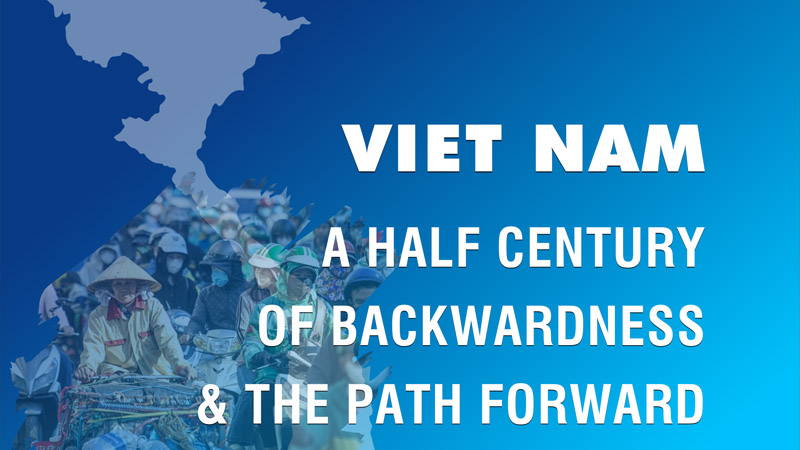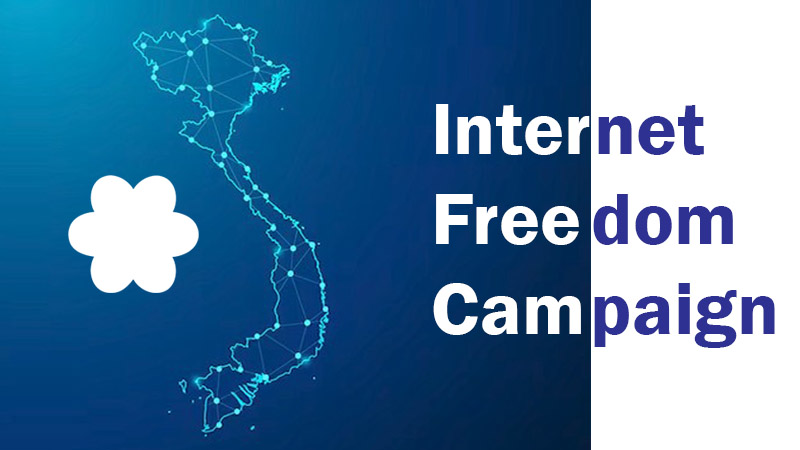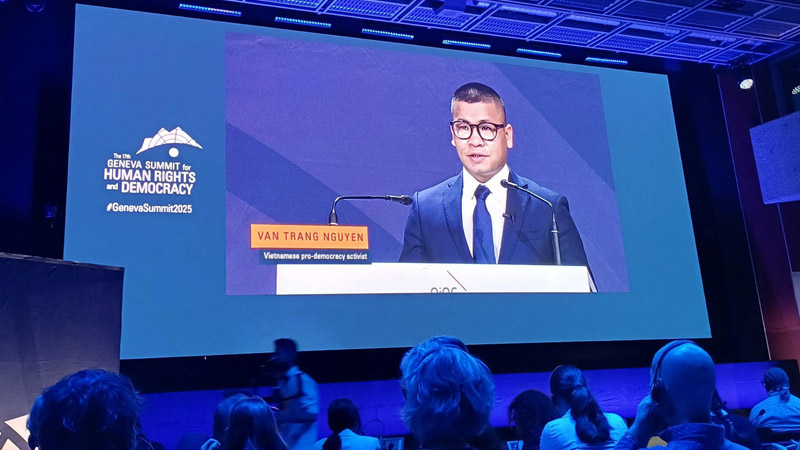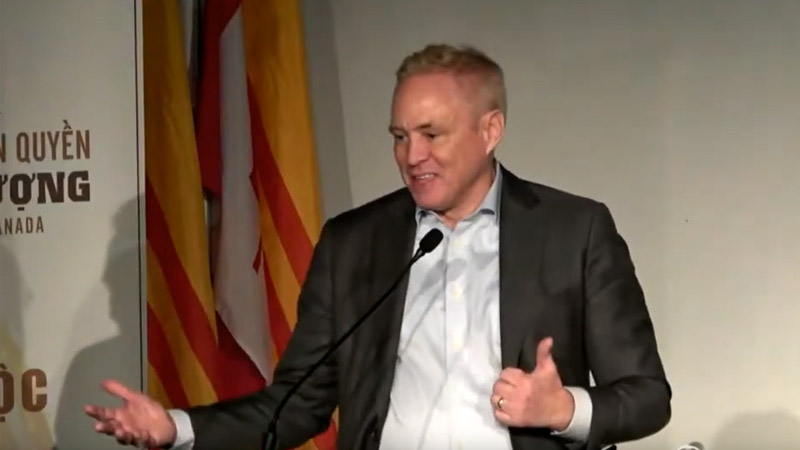Viet Tan brings you the latest analysis on pressing issues in Vietnam. The emergence of independent civil society organizations coupled with closer ties with the outside world has led to more opportunities for activists to attend seminars, conferences, and meetings. Unfortunately, there have been increasing reports of activists being denied their right to travel.
April 16, 2015
By Duy Hoang, Don Le
The Vietnamese government imposes arbitrary restrictions to prevent activists from foreign travel. Despite the Vietnamese constitution guaranteeing freedom of movement, authorities routinely confiscate passports, detain passengers at the airport for questioning, and employ “blacklists” against bloggers and human rights defenders.
The government codifies travel restrictions through sweeping claims of national security. But, more often, police just halt travelers without reason. Not all of these instances are publicly known, but according to Viet Tan’s research, at least 26 activists have been prevented from traveling abroad in the last two years.
Such restrictions are contrary to Article 23 of the Vietnam constitution which states:
“Citizens have the right to free movement and residence within the country, and the right to leave the country and to return home from abroad. The exercise of those rights shall be prescribed by law.”
In recent years, the emergence of independent civil society organizations coupled with closer ties with the outside world has led to more opportunities for activists to attend seminars, conferences, and meetings. Unfortunately, there have been increasing reports of activists being denied their right to travel.
Prominent independent journalist Pham Chi Dung was stopped at Tan Son Nhat Airport in February 2014 and barred from traveling to Geneva for Vietnam’s Universal Periodic Review (UPR) at the United Nations, despite having a valid passport and Swiss visa. Citing that it would be “harmful to the human rights image of Vietnam,” authorities prevented Dung from boarding his flight and confiscated his passport.
In March 2015, Reverend Anton Le Ngoc Thanh, the managing editor of a popular independent media website, was prevented from flying to Manila to speak at RightsCon, an international conference promoting an open internet. His passport was seized upon questioning and he was never given an official reason why he was stopped from boarding his flight.
For activists who are fortunate to exit Vietnam, they are often harassed and interrogated upon return.
In May 2014, blogger Nguyen Dinh Ha was questioned for 24 hours when he came back from World Press Freedom Day events in the United States. Ha was threatened and had many of his belongings confiscated, including his laptop, iPad, and passport. Security police then forced Ha to sign an affidavit with empty pages that potentially could be filled in at a later date by authorities.
Contravening Vietnamese and International Law
Despite the Vietnamese constitution recognizing freedom of movement, this right is curtailed in practice by restrictive laws and their arbitrary implementation (or even non-implementation).
Many of the activists prevented from traveling abroad were stated vague decrees used by security police as to why they were not permitted to travel. Most commonly cited is Decree 136/2007/ND-CP on Vietnamese citizens’ exit and entry. Issued by prime minister Nguyen Tan Dung in August 2007, Decree 136 details the several justifications for denying Vietnamese citizens permission to leave the country including “safeguarding national security and social order and safety.”
The problem with Decree 136 is that there is no clear definition for safeguarding national security. Hence, it is not apparent why an activist attending an international conference could be considered a threat to social order and safety.
Furthermore, according to Decree 136, only government ministers and heads of certain agencies are permitted to make decisions banning travel. Immigration control agents are just authorized to make decisions in cases where travelers incur administrative violations. In reality, activists possessing valid travel documents have been stopped from boarding their flights by airport police without a signed order by the proper government minister or agency head.
The travel issue is emblematic of the larger problem of rule by law in Vietnam. The Vietnamese constitution enshrines basic rights, which are then restricted by the laws, which are often not faithfully implemented in practice. This situation allows authorities to claim that they respect basic rights and only crackdown against lawbreakers while vaguely addressing what constitutes lawbreaking.
Under international law, Vietnamese citizens have the right to freely leave and return to Vietnam. Article 13 of the Universal Declaration of Human Rights states that “everyone has the right to leave any country, including his own, and to return to his country.” Vietnam has also ratified the International Covenant on Civil and Political Rights which establishes in Article 12 that “everyone shall be free to leave any country, including his own.”
Recommendations
Preventing activists from traveling abroad is a step backward for Vietnam and undermines the country’s ability to integrate with the world. International civil society advocates should:
- Continue to raise the issue of freedom of movement and urge the Vietnamese authorities to respect its obligations under international law.
- Provide focused advocacy for specific cases of Vietnamese activists who have been arbitrarily banned from traveling and/or have had their passports confiscated.
- Assist Vietnamese human rights lawyers to challenge the travel bans against activists through the use of local law and legal arguments.
| Date of incident | Vietnamese activist | Details |
|---|---|---|
| May 10, 2013 | Huynh Ngoc Chenh | Stopped at Tan Son Nhat Airport (along with his daughter) from boarding a flight to the United States |
| July 2, 2013 | Nguyen Hoang Duc | Stopped at Noi Bai Airport, prevented from travelling to Rome to attend the beatification of the late Cardinal Francois Xavier Nguyen Van Thuan |
| December 13, 2013 | Chau Van Thi | Stopped at the Moc Bai border crossing, prevented from entering Cambodia |
| December 13, 2013 | Nguyen Thao Chi | Stopped at the Moc Bai border crossing, prevented from entering Cambodia |
| December 14, 2013 | Nguyen Hoang Vi | Stopped at Tan Son Nhat Airport, prevented from traveling to meet with various international organizations and the UN in Thailand |
| December 15, 2013 | Dao Trang Loan | Stopped at Tan Son Nhat Airport, prevented from traveling to meet with various international organizations and the UN in Thailand |
| December 15, 2013 | Nguyen Thi Bich Hanh | Stopped at Noi Bai Airport, prevented from traveling to Thailand |
| January 15, 2014 | Nguyen Ho Nhat Thanh | Stopped at Tan Son Nhat, prevented from traveling to Washington D.C. to meet with human rights groups |
| February 1, 2014 | Pham Chi Dung | Stopped at Tan Son Nhat Airport, prevented from attending a series of events in Geneva leading up to the UN Human Rights Council’s Universal Periodic Review of Vietnam |
| April 5, 2014 | Nguyen Lan Thanh | Stopped at Noi Bai Airport, prevented from attending a U.S. Congressional briefing and series of events marking World Press Freedom Day |
| April 13, 2014 | Anna Huyen Trang | Stopped at Tan Son Nhat Airport, prevented from attending a U.S. Congressional briefing and series of events marking World Press Freedom Day; physically harassed by security police |
| April 15, 2014 | Nguyen Thanh Thuy | Stopped at Tan Son Nhat Airport, prevented from traveling to the United States; Thuy’s father (writer Nguyen Xuan Nghia) was imprisoned at the time |
| May 6, 2014 | Dinh Xuan Thi | Stopped at Noi Bai Airport, prevented from traveling to Manila, Philippines |
| May 6, 2014 | Le Phuc Hiep | Stopped at Noi Bai Airport, prevented from traveling to Manila, Philippines |
| May 16, 2014 | Nguyen Dinh Ha | Interrogated at Tan Son Nhat Airport for 24 hours upon return from the United States following a U.S. Congressional briefing and series of events marking World Press Freedom Day; passport confiscated |
| May 24, 2014 | Nguyen Chi Tuyen | Stopped at Noi Bai Airport, prevented from attending the Stockholm Internet Forum 2014 |
| July 7, 2014 | Pham Dac Dat | Stopped at Tan Son Nhat Airport, prevented from attending the First National Vietnamese Youth Conference in Australia |
| July 7, 2014 | Nguyen Van Trang | Stopped at Tan Son Nhat Airport, prevented from attending the First National Vietnamese Youth Conference in Australia |
| September 3, 2014 | Do Thi Minh Hanh | Stopped at Noi Bai Airport, prevented from visiting her sick mother in Austria; passport confiscated |
| November 14, 2014 | Hoang Van Dung | Stopped at Dinh Ba international border checkpoint; passport confiscated |
| November 14, 2014 | Nguyen Nu Phuong Dung | Stopped at Dinh Ba international border checkpoint; passport confiscated |
| November 16, 2014 | Le Duc Triet | Stopped at Tan Son Nhat Airport, prevented from traveling to Burma; passport confiscated |
| November 16, 2014 | Luu Van Minh | Stopped at Noi Bai Airport, prevented from traveling to Burma |
| November 17, 2014 | Nguyen Cong Thu | Stopped at Tan Son Nhat Airport, prevented from traveling to Thailand |
| March 22, 2015 | Rev. Anton Le Ngoc Thanh | Stopped at Tan Son Nhat Airport, prevented from traveling to Manila for RightsCon; passport confiscated |
| April 3, 2015 | Le Thu Ha | Stopped at Noi Bai Airport, prevented from traveling to Sweden to attend an international conference organised by Civil Rights Defenders |






